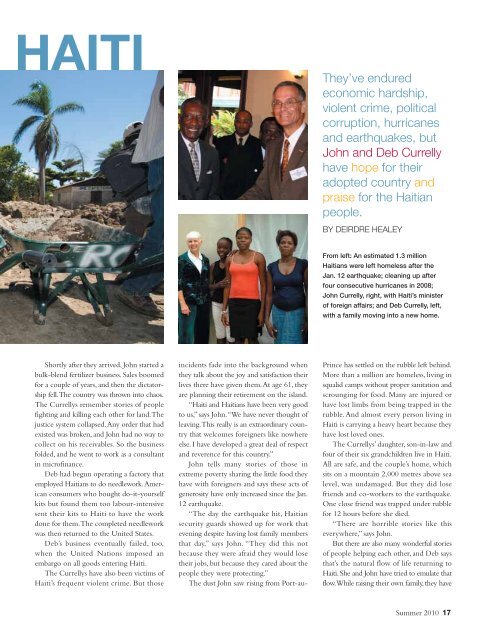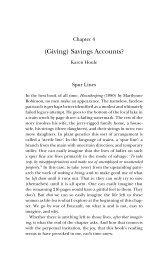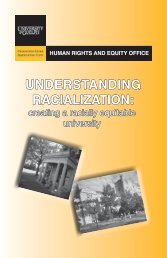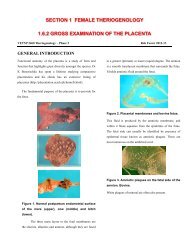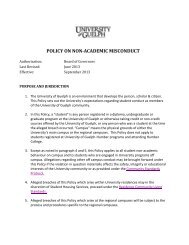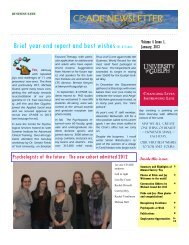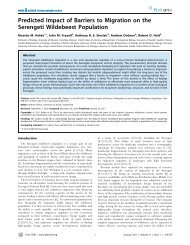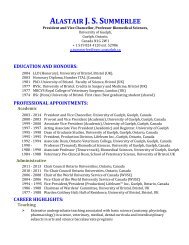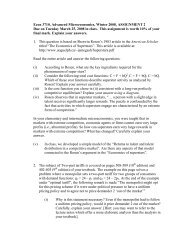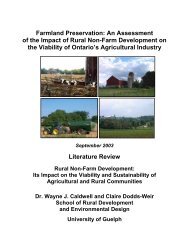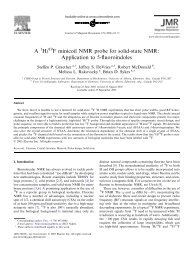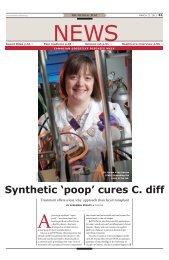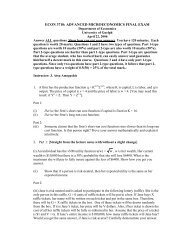Summer 2010 - University of Guelph
Summer 2010 - University of Guelph
Summer 2010 - University of Guelph
- No tags were found...
You also want an ePaper? Increase the reach of your titles
YUMPU automatically turns print PDFs into web optimized ePapers that Google loves.
HAITIThey’ve enduredeconomic hardship,violent crime, politicalcorruption, hurricanesand earthquakes, butJohn and Deb Currellyhave hope for theiradopted country andpraise for the Haitianpeople.BY DEIRDRE HEALEYFrom left: An estimated 1.3 millionHaitians were left homeless after theJan. 12 earthquake; cleaning up afterfour consecutive hurricanes in 2008;John Currelly, right, with Haiti’s minister<strong>of</strong> foreign affairs; and Deb Currelly, left,with a family moving into a new home.Shortly after they arrived, John started abulk-blend fertilizer business. Sales boomedfor a couple <strong>of</strong> years, and then the dictatorshipfell. The country was thrown into chaos.The Currellys remember stories <strong>of</strong> peoplefighting and killing each other for land. Thejustice system collapsed. Any order that hadexisted was broken, and John had no way tocollect on his receivables. So the businessfolded, and he went to work as a consultantin micr<strong>of</strong>inance.Deb had begun operating a factory thatemployed Haitians to do needlework. Americanconsumers who bought do-it-yourselfkits but found them too labour-intensivesent their kits to Haiti to have the workdone for them. The completed needleworkwas then returned to the United States.Deb’s business eventually failed, too,when the United Nations imposed anembargo on all goods entering Haiti.The Currellys have also been victims <strong>of</strong>Haiti’s frequent violent crime. But thoseincidents fade into the background whenthey talk about the joy and satisfaction theirlives there have given them. At age 61, theyare planning their retirement on the island.“Haiti and Haitians have been very goodto us,” says John. “We have never thought <strong>of</strong>leaving. This really is an extraordinary countrythat welcomes foreigners like nowhereelse. I have developed a great deal <strong>of</strong> respectand reverence for this country.”John tells many stories <strong>of</strong> those inextreme poverty sharing the little food theyhave with foreigners and says these acts <strong>of</strong>generosity have only increased since the Jan.12 earthquake.“The day the earthquake hit, Haitiansecurity guards showed up for work thatevening despite having lost family membersthat day,” says John. “They did this notbecause they were afraid they would losetheir jobs, but because they cared about thepeople they were protecting.”The dust John saw rising from Port-au-Prince has settled on the rubble left behind.More than a million are homeless, living insqualid camps without proper sanitation andscrounging for food. Many are injured orhave lost limbs from being trapped in therubble. And almost every person living inHaiti is carrying a heavy heart because theyhave lost loved ones.The Currellys’ daughter, son-in-law andfour <strong>of</strong> their six grandchildren live in Haiti.All are safe, and the couple’s home, whichsits on a mountain 2,000 metres above sealevel, was undamaged. But they did losefriends and co-workers to the earthquake.One close friend was trapped under rubblefor 12 hours before she died.“There are horrible stories like thiseverywhere,” says John.But there are also many wonderful stories<strong>of</strong> people helping each other, and Deb saysthat’s the natural flow <strong>of</strong> life returning toHaiti. She and John have tried to emulate thatflow. While raising their own family, they have<strong>Summer</strong> <strong>2010</strong> 17


